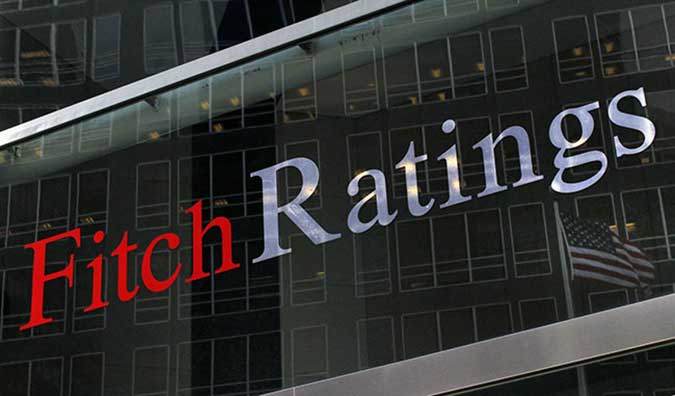News
Domestic Debt Restructuring plan should reduce funding and liquidity risk for non-bank financial institutions – Fitch

Sri Lanka’s proposed government debt restructuring plan should reduce funding and liquidity risk for non-bank financial institutions (NBFIs), Fitch Ratings said, issuing a press release on Friday.
It said that Sri Lankan government’s debt restructuring plan avoids direct impact on the local-currency government debt holdings of NBFIs and commercial banks, easing uncertainty over the entities’ capital, funding, and liquidity profiles.
Nonetheless, the proposal is only one aspect of the sovereign’s debt sustainability plan, and the weak economic environment continues to pose downside risk to the sector, Fitch said.
Sri Lankan NBFIs’ government debt holdings mainly comprise local-currency treasury securities to meet regulatory liquid-asset requirements and for investment returns.
Finance and leasing companies (FLCs) have boosted government debt securities holdings amid a weak economic outlook, lackluster lending opportunities and a preference for stronger liquidity buffers at a time of extreme market uncertainty, the press release said.
However, these holdings are not excessive, at around eight percent of sector assets at end-March 2023 (they were five percent at end-March 2020), but any direct impact from a government restructuring plan would have added to asset quality and earnings pressure arising from Sri Lanka’s difficult economic backdrop.
On Wednesday, Fitch downgraded Sri Lanka’s Long-Term Local-Currency (LTLC) Issuer Default Rating (IDR) to “C” from “CC.”
A day earlier, Fitch said that the Sri Lankan government’s domestic debt restructuring proposal was a significant step in resolving uncertainties in the local banking sector.The Sri Lankan Parliament approved the government’s domestic debt restructuring plan on 01 July.
Given below are excerpts of the press release: “These securities also comprise a larger proportion of banking-sector assets, and any losses arising from a restructuring could have further constrained banks’ capacity and willingness to provide funding to the NBFI sector. Foreign-currency denominated Sri Lanka Development Bonds will be subject to restructuring, but Fitch-rated NBFIs have no exposure to these instruments.
“We also do not expect the latest proposal to prompt a loss of depositor confidence in the banking system that would raise contagion risk for NBFIs’ deposits and bank funding lines. For more analysis on the implications for the banking sector, see Sri Lanka’s Domestic Debt Plan a Significant Step for Resolving Bank Uncertainty.
“Fitch views the funding and liquidity profiles of Sri Lankan NBFIs as closely linked to that of banks, given the NBFIs’ dependence on banks as a funding source. FLCs sourced approximately 73% of total non-deposit funding from other financial institutions as at end-March 2023, of which the bulk would be from banks. Similarly, banks are major funding providers for other NBFI sub-sectors, such as securities firms. FLCs’ credit drivers are also linked to those of banks due to their bank-like business models, common prudential regulator and predominant domestic exposure.
“Sri Lankan NBFIs continue to face significant downside risks beyond those addressed in the recent proposal. The economy contracted by 11.5% in 1Q23, pressuring the FLC sectors’ already-high non-performing loan ratio of 16% as at end-March 2023, while higher funding costs have crimped net interest margins and profitability. We expect economic conditions to remain difficult, particularly for FLCs’ largely sub-prime customer base, despite a modest improvement in inflation, interest rate and exchange rate trends in recent weeks.
“Capital markets are likely to stay volatile despite recent positive moves, keeping the financial prospects of securities firms less predictable in the near term. Any resistance from other government debt holders could also hold back the proposal and raise fresh doubts for the domestic financial system.
The debt announcement and subsequent sovereign rating action do not directly impact Fitch’s national ratings on Sri Lankan NBFIs. The ratings remain on Rating Watch Negative (RWN) due to ongoing operating environment risks, which could weaken NBFIs’ credit profiles relative to other entities on the national ratings scale. We would look to resolve the RWNs upon greater stability in the domestic economy and financial markets, and better visibility on how the economic downturn will affect NBFIs’ franchises and financial profiles. This could require more clarity on the final outcome of the debt restructuring, including on foreign-currency debt, and the impact on the banking and corporate sectors.”
News
US sports envoys to Lanka to champion youth development

The U.S. Embassy in Colombo welcomed the U.S. Sports Envoys to Sri Lanka, former National Basketball Association (NBA) and Women’s National Basketball Association (WNBA) players Stephen Howard and Astou Ndiaye, from June 8 through 14.
The Public Diplomacy section of the U.S. Embassy said that it would launch a weeklong basketball program intended to harness the unifying power of sports, made possible through collaboration with Foundation of Goodness and IImpact Hoop Lab.
While in Sri Lanka, Howard and Ndiaye, both retired professional basketball players, will conduct a weeklong program, Hoops for Hope: Bridging Borders through Basketball. The Sports Envoys will lead basketball clinics and exhibition matches and engage in leadership sessions in Colombo and Southern Province for youth aged 14-18 from Northern, Uva, Eastern and Western Provinces, offering skills and leadership training both on and off the court. The U.S. Envoys will also share their expertise with the Sri Lanka Basketball Federation, national coaches, and players, furthering the development of basketball in the country. Beyond the clinics, they will collaborate with Sri Lankan schoolchildren to take part in a community service project in the Colombo area.
“We are so proud to welcome Stephen and Astou as our Sports Envoys to Sri Lanka, to build on the strong people-to-people connections between the United States and Sri Lanka,” said U.S. Ambassador Julie Chung. “The lessons that will be shared by our Sports Envoys – communication, teamwork, resilience, inclusion, and conflict resolution – are essential for leadership development, community building, equality, and peace. The U.S. Sports Envoy program is a testament to our belief that sports can be a powerful tool in promoting peace and unity.”
News
Rahuman questions sudden cancellation of leave of CEB employees

SJB Colombo District MP Mujibur Rahuman in parliament demanded to know from the government the reasons for CEB suspending the leave of all its employees until further notice from Thursday.
MP Rahuman said that the CEB has got an acting General Manager anew and the latter yesterday morning issued a circular suspending leave of all CEB employees with immediate effect until further notice.
“We demand that Minister Kanchana Wijesekera should explain this to the House. This circular was issued while this debate on the new Electricity Amendment Bill was pending. There are many who oppose this Bill. The Minister must tell parliament the reason for the urge to cancel the leave of CEB employees,” the MP said.However, Speaker Mahinda Yapa Abeywardena prevented Minister Wijesekera responding to the query and said that the matter raised by MP Rahuman was not relevant.
News
CIPM successfully concludes 8th Annual Symposium

The Chartered Institute of Personnel Management (CIPM) successfully concluded the 8th Annual CIPM Symposium, which took place on 31st May 2024. Themed “Nurturing the Human Element—Redefining HRM in a Rapidly Changing World,” the symposium underscored the pivotal role of human resource management (HRM) in today’s dynamic global landscape. Since its inception in 1959, CIPM has been dedicated to advancing the HR profession through education, professional development, and advocacy, solidifying its position as Sri Lanka’s leading professional body for HRM.
Ken Vijayakumar, the President of the CIPM, graced the occasion as the chief guest. The symposium commenced with the welcome address by the Chairperson, Prof. Arosha Adikaram, followed by the Web Launch of the Symposium Proceedings and Abstract Book by the CIPM President. The event featured distinguished addresses, including a speech by Chief Guest Ken Vijayakumar, President of CIPM, and an address by Guest of Honor Shakthi Ranatunga, Chief Operating Officer of MAS Holdings Pvt. Ltd., Sri Lanka.
The symposium also featured an inspiring keynote address by Prof. Mario Fernando, Professor of Management and Director of the Centre for Cross Cultural Management (CCCM) at the University of Wollongong, Australia.
Vote of Thanks of the inauguration session was delivered by Dr. Dillanjani Weeratunga, Symposium Co-chair.
The symposium served as a comprehensive platform for researchers to present their findings across a wide range of critical topics in HRM. These included Cultural Diversity and Inclusion, Talent Development and Retention, Ethical Leadership and Corporate Social Responsibility, Adapting to Technological Advancements, Mental Health and Well-being at Work, Global Workforce Challenges, Employee Empowerment, and Reskilling and Upskilling.
The plenary session was led by Prof. Wasantha Rajapakse. Certificates were awarded to the best paper presenters during the valedictory session, followed by a vote of thanks delivered by Kamani Perera, Manager of Research and Development.
The annual symposium of CIPM was a truly inclusive event, attracting a diverse audience that spanned undergraduates, graduates, working professionals, research scholars and lecturers. This widespread interest highlights the symposium’s significance in the field of HRM, offering a unique opportunity for everyone to network and learn from scholarly brains.The CIPM International Research Symposium was sponsored by Hambantota International Port, Sri Lanka Institute of Information Technology (SLIIT), E B Creasy & Co. PLC, and Print Xcel Company.
























